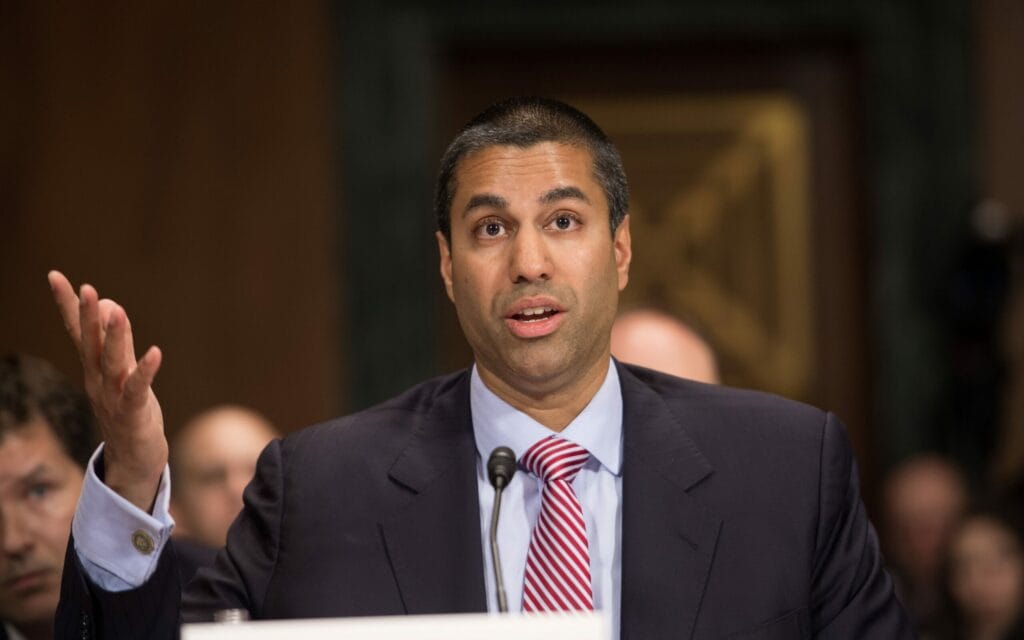Ajit Pai Investment Firm Concerned About FCC’s Foreign Reporting Threshold Proposal
The FCC is proposed reducing the threshold for disclosing ownership stake in companies.

WASHINGTON, April 13, 2023 – Former Federal Communications Commission Chairman Ajit Pai has expressed concern with agency commissioners about a proposed rule to be voted on by the commission next week that would lower the threshold for which companies would need to report investors in telecoms operating in the country.
To reduce national security risks, commission chairwoman Jessica Rosenworcel proposed last month periodic national security reviews of companies that seek to offer international services originating and terminating in the country – known as a section 214 authorization – and to reduce the ownership reporting threshold from investors with a 10 percent to a 5 percent stake. Under the current rules, after it is granted authorization, a company is only required to update the commission with ownership information when there has been a modification, transfer of control or discontinuance of service.
But two investment firms that submitted a letter to the FCC Wednesday recapping a previous meeting said they spoke with commissioners Geoffrey Starks and Brendan Carr warning that lowering the threshold risks deterring investments from those minority owners in part because their investments are conditional on being confidential.
“For example, some investors’ bylaws prohibit public disclosure of their investments and confidentiality has been negotiated between the funds and the investors ahead of any investments being made or even identified as a prospect,” said the letter, which came after the meeting that included Pai’s private equity firm Searchlight Capital Partners and representatives from investment firm DigitalBridge Group. The firms said they already “perform appropriate due diligence” on investors, who contribute money that the firms then invest in companies, such as telecoms.
“A significantly larger number of investors – foreign and domestic – would be reportable under a 5 percent threshold than is reportable under the current 10 percent regime,” the letter said. “In the vast majority of cases, these minority limited partners are passive investors, and it is extremely rare for any investors holding an equity interest of less than 10% to have any indicia of control (such as governance rights or board or observer seats).”
The firms said these minority investors “lack substantive rights and receive only high-level financial information regarding the overall performance of an investment.” Reporting that information would “not promote any legitimate national security interest” to require disclosure of such investors who have “insignificant equity interest and lack any control of day-to-day operations,” the letter said.
Concerns about retroactive effect for existing investors and a negative impacts on future investors
The firms added that the new rules would have a “retroactive effect” for existing investors and a “negative prospective impact on future capital formation and fundraising efforts.”
“The practical effect, therefore, would be to discourage critical investments by institutional investors of capital into the U.S. telecommunications sector without any corresponding national security benefits,” the letter noted, adding the rules could trigger other countries to lower their thresholds and expose minority U.S. investors overseas.
The firms requested that the commission delete the threshold reduction. If it does not, they proposed a possible exemption to these minority investors that they say already exists in broadcast ownership rules.
The FCC will vote on whether to adopt the proposed rulemaking at next week’s open meeting. If adopted, it will go through a consultation process where the public can comment on it.
The FCC says it works with the Department of Justice’s Committee for the Assessment of Foreign Participation in the United States Telecommunications Services Sector to assess national security risks.
The commission has offered the executive branch with help in dealing with these threats, such as from Chinese companies. Rosenworcel’s proposal is based in part on recommendations from a 2020 report from a Senate subcommittee on Homeland Security that suggested periodic section 214 reviews. Rosenworcel reintroduced the idea after the commission first introduced proceedings to revoke the operating authorities of China Unicom Americas, Pacific Networks and subsidiary ComNet.
The proposed rules come as Washington seeks to remove national security threats from the country’s critical infrastructure. The commission has already halted authorizations to certain companies to operate in the country until it reviews the certification rules.










